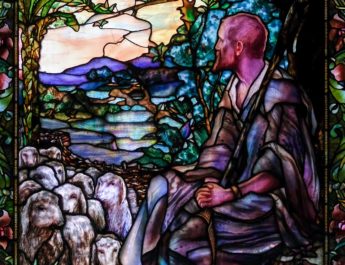2 Timothy 2:8-15
Ordinary C46
A “remember” = mnemoneuo. From mnemon (mindful) OR from mneme (memory or mention); {from mnaomai (to remember; by implication give reward or consequence) or mimnesko (to remind or remember; memory through an active, intentional process or being mindful; not incidentally or accidentally remembering); or form meno (to stay, abide, wait, endure) or from massaomai (to chew, gnaw); from masso (to knead, squeeze)}. This is to remember, recollect. It does not necessarily imply remembering something that you forgot – it could be simply calling something to mind. It can mean to punish or rehearse.
B “Jesus” = Iesous. From Hebrew Yehoshua (Joshua, the Lord is salvation); {from YHVH (proper name of the God of Israel; the self-existent and eternal one); {from havah (to become) or from hayah (to come to pass, become, be)} + yasha (to deliver, defend, help, preserve, rescue; properly, to be open, wide or free, which implies being safe. So, in a causative sense, this is to free someone)}. This is Jesus or Joshua in Greek – the Lord saves or the Lord is salvation.
C “Christ” = Christos. From chrio (consecrate by anointing with oil; often done for prophets, priests, or kings). Literally, the anointed one, Christ. The Greek word for Messiah.
raisedD from the dead,E a descendantF of DavidG—that is my gospel,H
D “raised” = egeiro. This is to awake, raise up or lift up. It can be to get up from sitting or lying down, to get up from sleeping, to rise from a disease or from death. Figuratively, it can be rising from inactivity or from ruins.
E “dead” = nekros. Perhaps from nekus (corpse). This is dead or lifeless, mortal, corpse. It can also be used figuratively for powerless or ineffective. It is where the word “necrotic” comes from.
F “descendant” = sperma. From speiro (to sow seed, spread, scatter); perhaps from spao (to pull, to draw a sword). This is something sown so it could be seed or offspring and descendants. This is where the word “sperm” comes from.
G “David” = Dauid. From Hebrew David (David); from the same as dod (beloved, love, uncle); the root may mean to boil, which is used figuratively to describe love. So, this implies someone you love such as a friend, a lover, or a close family member like an uncle. David’s name likely means something like “beloved one.”
H “gospel” = euaggelion. From eu (well, good, rightly) + aggelos (angel, messenger; a messenger from God bringing news – whether a prophet or an angel); {from aggellos (to bring tidings); probably from ago (to bring, lead, carry, guide)}. This is literally “the good news,” used for the gospel. This is also where “evangelism” comes from.
9 for which I suffer hardship,I even to the point of being chainedJ like a criminal.K
I “suffer hardship” = kakopatheo. 3x in NT. From the same as kakopatheia (suffering, distress, hardship; undergoing evil); {from kakos (bad, evil, harm, ill; evil that is part of someone’s core character – intrinsic, rotted, worthless, depraved, causing harm; deep inner malice that comes from a rotten character) + pathos (passion, lust, suffering, something that happens to you, strong feelings); {from pascho (to be acted on for good or ill; often used for negative treatment; properly, feeling strong emotions – especially suffering; can also be the ability to feel suffering)}}. This is to experience hardship or evil – to suffer.
J “chained” = desmos. 18x in NT. From deo (to tie, bind, fasten, impel, compel; to declare something against the law or prohibited). This is a chain, bond, infirmity, impediment.
K “criminal” = kakourgos. Related to “suffer hardship” in v9. 4x in NT– 3x of those crucified with Jesus in Luke 23 & 1x of the author of 2 Timothy being chained like a criminal (2:9). From kakos (see note I above) + the same as ergon (word, task, action, employment);{from ergo (to work, accomplish) or from erdo (to do)}. This is literally wrongdoer – a criminal, someone who does evil.
But the wordL of GodM is not chained.N
L “word” = logos. From lego (to speak, tell, mention). This is word, statement, speech, analogy. It is a word that carries an idea or expresses a thought, a saying. It could refer to a person with a message or reasoning laid out in words. By implication, this could be a topic, line of reasoning, or a motive. It can be used for a divine utterance or as Word – Christ.
M “God” = Theos. From Proto-Indo-European origins, meaning do, put, place. This is God or a god in general.
N “chained” = deo. Related to “chained” in v9. See note J above.
10 Therefore I endureO everythingP for the sake of the elect,Q
O “endure” = hupomeno. Related to “remember” in v8. 17x in NT. From hupo (by, under, about, subordinate to) + meno (see note A above). This is properly to remain behind or remain under. It implies endurance, patience, steadfastness, enduring trials, and waiting in hope.
P “everything” = pas. This is all or every.
Q “elect” = eklektos. Related to “word” in v9. From eklego (to choose, select, elect); {from ek (from, from out of) + lego (see note L above)}. This is to select or choose. It is making a personal choice – a favorite.
so that they may also obtainR the salvationS that is in Christ Jesus, with eternalT glory.U
R “obtain” = tugchano. 12x in NT. Root means to become ready. This word is to hit, meet, happen, obtain, chance, perhaps. Properly, it means to hit the mark or be spot on. Thus, it is the opposite of the Greek word for sin hamartano, which literally means to miss the mark.
S “salvation” = soteria. From soter (a savior, deliverer); from sozo (to save, heal, preserve, or rescue; taking someone from danger to safety; delivering or protecting literally or figuratively); from sos (safe, rescued, well). This is deliverance, salvation, preservation, welfare, prosperity, safety.
T “eternal” = aionios. From aion (an age, length of time). This is age-long, forever, everlasting. Properly, that which lasts for an age. This is where eon comes from.
U “glory” = doxa. From dokeo (to have an opinion, seem, appear, suppose; a personal judgment; to think); from dokos (opinion). This is literally something that evokes a good opinion – something that connects to our understanding of intrinsic worth. The ultimate expression of this is, of course, God and God’s manifestation. So, this is opinion, honor, and dignity, but also praise, glory, renown, and worship.
11 The sayingV is sure:W
If we have died withX him, we will also live withY him;
V “saying” = logos. Same as “word” in v9. See note L above.
W “sure” = pistos. From peitho (to have confidence, urge, be persuaded, agree, assure, believe, have confidence, trust). This is faithful, trustworthy, reliable, sure, or true. It is a fullness of faith. This is the same root as the word “faith” in Greek.
X “died with” = sunapothnesko. 3x in NT. From sun (with, together with) + apothnesko (to die off; death with an emphasis on the way that death separates; to wither or decay); {from apo (from, away from) + thnesko (to die, be dead)}. This is to die with or similarly to.
Y “live with” = suzao. 3x in NT. From sun (with, together with) + zao (to live literally or figuratively). This is to live with, co-survive, live together.
12 if we endure, we will also reign withZ him;
if we denyAA him, he will also deny us;
13 if we are faithless,BB he remainsCC faithfulDD—
he cannotEE deny himself.
Z “reign with” = sumbasileuo. 2x in NT. From sun (with, together with) + basileuo (to reign as king, to rule in a literal or figurative sense); {from basileus (king, emperor, sovereign); probably from basis (step, hence foot; a pace); from baino (to walk, to go}. This is to reign with, be a co-regent.
AA “deny” = arneomai. From a (not) + rheo (say, speak of). This is to deny, disown, refuse, repudiate someone or a previously held belief, to contradict.
BB “are faithless” = apisteo. Related to “sure” in v11. 8x in NT. From apistos (unbelieving, incredulous, faithless; someone who rejects faith); {from a (not, without) + pistos (see note W above)}. This is to intentionally disbelieve, prove false. It can be one who has never believed or a believer who goes astray.
CC “remains” = meno. Related to “remember” in v8 & “endure” in v10. See note A above.
DD “faithful” = pistos. Same as “sure” in v11. See note W above.
EE “cannot” = ou + dunamai. Dunamai is to be able, or something that is possible. It can also be empowered or being powerful. The Greek word for “miracle” (dunamis) comes from this root.
14 RemindFF them of this, and warnGG them beforeHH the LordII
FF “remind” = hupomimnesko. Related to “remember” in v8 & “endure” in v10 & “remains” in v13. 7x in NT. From hupo (by, under, about, subordinate to) + mimnesko (see note A above). This is to remind, call attention to.
GG “warn” = diamarturomai. 15x in NT. From dia (through, across to the other side, thoroughly) + marturomai (to witness, testify, call as a witness, affirm, charge, protest); {from martus (a witness whether having heard or seen something; witness literally, judicially, or figuratively; by analogy, a martyr)}. This is to affirm, give evidence, testify thoroughly. It is giving full testimony.
HH “before” = enopios. From en (in, on, at, by, with) + ops (eye, face); {from optanomai (to appear, be seen); from horao (become, seem, appear)}. This is literally “in sight of.” It means before in a literal or figurative sense.
II “Lord” = Theos. Same as “God” in v9. See note M above.
that they are to avoid wrangling over words,JJ which does no goodKK but only ruinsLL those who are listening.MM
JJ “wrangling over words” = logomacheo. Related to “word” in v9 & “elect” in v10. 1x in NT. From logos (see note L above) + machomai (to fight, strive, dispute, quarrel; to war). This is to wrangle over words, fight about words.
KK “good” = chresimos. 1x in NT. From chresis (use, function, using sexually); from chraomai (to use, make use of, give what is needed, act in a specific way, request). This is good, useful, or profitable.
LL “ruins” = katastrophe. 2x in NT. From katastrepho (to overturn literally or figuratively – to be upside down, overthrow or ruin.); {from kata (down, against, throughout, among) + strepho (to turn, change, turn back, be converted; to turn around completely to take the opposite path or a completely different one); {from trope (turning, shifting, a revolution; figuratively, a variation); from trepo (to turn)}}. This is overthrowing, subverting, destruction, catastrophe, apostasy. It is where catastrophe comes form.
MM “listening” = akouo. This is hear or listen, but it also means to understand by hearing. This is where the word “acoustics” comes from.
15 Do your bestNN to presentOO yourself to God as one approvedPP by him,
NN “do…best” = spoudazo. 11x in NT. From spoude (haste, diligence, earnestness, effort; being swift to demonstrate one’s enthusiasm; doing what one is told right away and with full effort); from speudo (to hurry, urge on, await); probably from pous (foot in a figurative or literal sense). This is hurrying with eagerness or zeal. It is doing everything you can, diligently and quickly, fervently.
OO “present” = paristemi. From para (from beside, by) + histemi (to stand, place, set up, establish, stand ready, stand firm, be steadfast). This is literally to place by stand. It can mean to present, exhibit, appear, bring, stand by, or prove. It can also mean to be ready, to assist, to yield, or to commend.
PP “approved” = dokimos. Related to “glory” in v10. 7x in NT. From dechomai (to warmly receive, be ready for what is offered, take, accept, or welcome; to receive in a literal or figurative sense) or dokeo (see note U above). This is what passes the test, approved, acceptable, genuine, verified.
a workerQQ who has no need to be ashamed,RR rightly explainingSS the word of truth.TT
QQ “worker” = ergates. Related to “criminal” in v9. 16x in NT. From ergazomai (to work, labor); {from ergon (see note K above)}. This is a field laborer – later used to refer to workers in general. It can also be used figuratively for teachers.
RR “no need to be ashamed” = anepaischuntos. 1x in NT. From a (not, without) + epaischunomai (to be ashamed or disgraced. It is a personal humiliation or dishonor – a shame that matches an error); {from epi (on, upon, against, what is fitting) + aischuno to dishonor, put to shame, shrink, disfigure); {from aischos (shame, disgrace, disfigurement)}}. This is not ashamed.
SS “rightly explaining” = orthotomeo. 1x in NT. From orthos (straight, direct, morally upright) + tomos (sharp or keener); {from temno (to cut with as with a single slice)}. This is to cut straight, teach correctly, explain correctly.
TT “truth” = aletheia. From alethes (true, unconcealed; true because it is in concert with fact and reality – attested; literally, what cannot be hidden; truth stands up to test and scrutiny and is undeniable, authentic). {from a (not, without) + lanthano (unnoticed, concealed)}. Truth is literally that which is not or cannot be concealed. This word covers more than the sense of true versus false. It spoke of truth as that which corresponds to reality – reality as opposed to illusion. Thus, it includes, sincerity, straightforwardness, and reality itself.
Image credit: “Grass Chain Rust” by mendhak, 2011.




